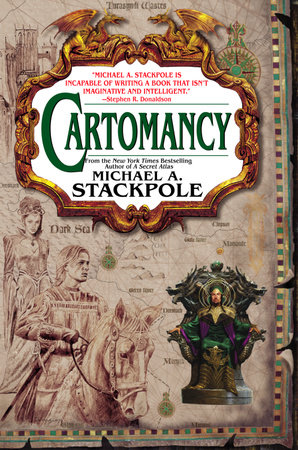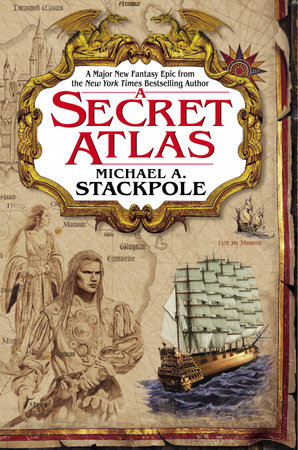Excerpt
Cartomancy
Chapter One
10th day, Month of the Wolf, Year of the Rat 9th Year of Imperial Prince Cyron’s Court 163rd Year of the Komyr Dynasty 737th year since the Cataclysm Derros, Erumvirine
Ranai Ameryne waited in the night, cloaked in shadow. She’d been living in the forest outside Serrian Istor for the better part of a week, becoming accustomed to its every aspect. Even in her days as a highwayman in Nalenyr, she had never become so attuned to her surroundings. As an outlaw she found fear and resentment of society constant companions, and they barred her from a union with nature as much as they did from society itself.
Here, in the forest, she found peace. She watched life surrounding her, studying the drama of predator and prey. Growing up, she’d had a basic education designed to allow her to fill a role within the vast governmental bureaucracy. That education had taught her that there was an order to all things, and that as long as it remained undisturbed, life was idyllic and perfect.
Her teachers had such information on very good authority. Grand Minister Urmyr had codified things with his books of wisdom in the earliest days of the Empire. As he was oft quoted as saying, “The wind is wise, and water wiser still, for none who oppose them can stand. Yet those who travel with them do so at ease and swiftly.”
And more often than not, such quotes are used to caution one against challenging a more powerful foe. She smiled, aware but uncaring that the scar on her left cheek twisted the smile awry. For those she awaited and would hunt, she would be the wind and the water.
She glanced up at the sky. Fryl, the owl-moon, had half its white face hidden by a black crescent. Its position confirmed what she knew in her heart, that the night was nearing its midpoint. Her opponents would soon be released. They would seek her, thinking they were the hunters, but they would be proven wrong.
She shivered as the faint echoes of fear ran through her. Up until the previous year’s Harvest Festival, she had proven other hunters equally wrong. Her name had been Pavynti Syolsar and, with her companions, she’d preyed on travelers in Nalenyr. The Festival had brought many people onto the road and she’d robbed most of them. She had stood against all of their defenders—including some very good swordsmen—and had defeated them all.
Save for Moraven Tolo. She’d not taken him for anything special at first. He had appeared to be nearing middle age—at least middle age for most men—though his long black hair had not been shot with white. He moved easily and without fear. He identified himself as one of the xidantzu, and she’d thought he was just one more of the wandering warriors she’d have to cut down before harvesting whatever gold his traveling companions possessed.
Then he told her to draw a circle.
A cold trickle ran down her spine even after four months. As good as she was, he was better. He was a Master of the Sword—a Grand Master and beyond. He was a Mystic, capable of making magic with his blade. He would have been the wind and water; I could have been earth, fire, and wood, and I could not have stood against him.
By rights she should have been dead, but he had chosen not to kill her. He put her through her paces and determined she had some skill with the sword she bore. So he demanded she travel south, to the Virine coast, to join Serrian Istor. Once Master Istor released her, she would spend nine years traveling as xidantzu.
She’d undertaken the journey south even though she could have run away at any time. While she had been a highwayman, she had clung to the honor of the swordsman. It was not fear of Moraven Tolo that kept her on her journey. It was the knowledge that she should have been dead—and complying with his command gave her a chance for a new life.
She embraced that new life and made her way quickly to Serrian Istor. She had been received immediately into the small cadre of students, most of whom were, at the closest, a decade her junior. Master Kalun Istor made no comment as she told him her tale and why she had come. She had expected derision or contempt, but got none.
Master Istor had listened; then, without a word, he took a brush, dipped it in ink, and quickly wrote. Setting the brush down, he turned the piece of paper around so she could read it. “You do know what it says?”
She’d nodded. “It can be read two ways. One is ‘the tiger’s young kitten.’ The other is Ranai Ameryne.”
The wizened swordmaster slitted his eyes and nodded. “For you it is both. You are a tiger yet to grow into your claws. You are also now known as Ranai Ameryne. Who and what you were before are gone. Welcome to my school, Ranai Ameryne.”
Master Istor proved to be as relentless as he was wise, pushing her constantly. He gave her responsibility for the adolescent students. They, in turn, pushed her, frustrated her and, in retrospect, taught her to curb the anger that would otherwise have had her lashing out mercilessly at them. Her care for them did not excuse her from her duties as a student, however, and often her personal studies lasted well into the night.
In her studies she came to grips with the conflict that had driven her to become an outlaw in the first place. Having been raised to believe that the wind and water swept all away before them, she spent her life waiting for retribution because she had chosen to defy convention. She had abandoned her early training and left home to study swordsmanship wherever she could find a school willing to take her in. She seldom stayed long with them—no more than two years and often much less—preferring to find a new school instead of deal- ing with the responsibilities and frustrations the old school thrust upon her.
Her life had become one of defiance, and she waited to be punished for it. Yet through Master Istor, she came to understand that she could be one who defied wind and water . . . or she could become wind and water. It was not a matter of finding accommodation with the world, but becoming strong enough that the world had to accommodate her.
That might have seemed a license for megalomania, but Ranai’s training and Master Istor’s guidance carried her beyond that. Just because she could destroy all those who defied her, it did not mean she must. She remained very aware that Moraven Tolo could have killed her but had stayed his hand. Following his example, she sought even the tiniest spark of potential in an individual. Were there no such spark, she could kill without compunction.
She also realized that part of the reason she had been assigned a small group of students was to learn to spot such sparks. While she was almost positive she would not have struck at any of her charges had she encountered them in her past life, the fact that she could not be absolutely certain bothered her. So she did restrain herself—and admired Moraven Tolo more for the restraint he had shown in the face of her far more serious provocation.
And now she waited in the darkened woods for her students to come hunt her. She had no doubt that one or the other of them would have tried to organize the group efficiently. She was likewise sure that several of the students would strike out on their own in an attempt to reap the glory of her capture by themselves.
While her easiest course would have been to locate those individuals and defeat them before facing the pack, reversing that strategy would be best. The exercise was meant to be one in which everyone learned that working in a team was preferable. If the group captured her, the value of teamwork would be shown. If it failed to do so and she subsequently hunted down the others and took them, the folly of striking out on their own would be proven.
Her awareness of the forest life sharpened her focus. Winter on the Virine coast did bring colder weather, but warm currents prevented snow from falling. Instead, misty rain prevailed, often producing fog. The forest creatures still thrived, but they had suddenly fallen silent. Curiously, the quietest quarter lay in the direction of the sea, not due south from Derros and the serrian.
Is it possible they thought I’d secure my eastern flank with the sea? And since I expected them to come from the south, they chose to come in from the sea? While the coastline was not very hospitable, little smuggler coves would allow a dozen students to bring in a small boat. Scaling the thirty-foot cliff would be no problem for them.
She slowly slid her scabbarded blade from her sash. Her black robes blended with the night, and her cowl only had holes for her eyes and ears. She’d blackened her exposed flesh with charcoal. Down by the shore she’d found bits of torn fishing nets from which she made an overshirt. Into it she stuffed branches ripped from trees. If she went to ground, she looked like a small shrub.
Moving with the silence her intimate knowledge of the area permitted, she headed east. The most obvious trail—a smuggler’s trail—wandered through small depressions, beaten flat by the tread of thousands. She hurried to a point where she could ambush the group, going to ground in the hole at the base of an uprooted tree.
Yet the silence continued, which surprised her. Tillid, the smallest of her students, had never remained quiet for so long. Still she heard nothing, save the wind’s whisper through the trees and the creaking clack of branches as they swayed.
Then, from above, came an awkward and surprised squawk, followed by a crunch. Something dropped onto the wet leaves beside her. A seahawk looked up at her with a golden eye, its mouth opened wide in a silent scream. The head, however, had been severed; the bird did not realize it was dead.
Even before she was consciously aware of danger to herself, Ranai bared her blade. The seahawk’s killer dove from the branches above and her sword arced up and around in a backhand slash. The blade bisected it. The lower body, legs pumping, fell into the wet leaves. Tree roots snared the upper torso, having already punched through the thing’s batlike wings.
She peered closely at it. It strongly resembled the tree frogs native to the area. Save for the wings. The moon’s dim light revealed hints of color in the stripes streaking its wet flesh.
The dying thing opened its mouth, revealing rows of triangular shark’s teeth. She pulled back at the sight, but not quickly enough. Its tongue flicked out and lashed her face. It cut through her cowl, and a barb sank into her flesh. Fire poured into the wound and she stumbled back. The creature died before its tongue could completely retreat, so it just dangled there, bright with her blood.
She raised a hand to her face. The barb had gone in over her cheekbone. Half an inch higher and she’d have been blinded. As it was she could feel the swelling start and already tears poured from her eye.
Ranai fought the first instinct to run. She wanted to credit it to courage, but it was nothing more than logic. Whatever the creature was, it could fly, so she couldn’t outrun it. If that had been the only one, she was safe. If there were more, they’d eventually find her and kill her. She was too far from Derros to give anyone warning and, as silent and nasty as that thing had been, only a handful of the students and staff had the skill to fight them.
And if they come in hundreds or thousands . . .
She shivered and pushed forward toward the sea. This thing—or it and companions—had been what had silenced the forest. She made her way along cautiously. Her right eye had already swollen shut, so she had to repeatedly turn her head to scan for danger. It took her half an hour to cross the thousand yards to the cliffs, but she arrived without further incident and crouched there.
The moon splashed silver over the water, which allowed her an easy view of the coastline all the way down to Derros Bay. Things wallowed there like huge barrels, but they were too long and slender. The length and breadth of a moderately sized open-ocean trader, they bobbed innocently in the dark water. As she watched, some sank out of sight and others rose like some sort of marine crocodile.
One that had just risen opened its mouth, revealing puff-adder-white flesh. Then black dots speckled it, hiding the white in shadow. The next moment the blackness rose vaporously. It twisted and curled in the sky, then turned and dove toward the sleeping town of Derros.
That is a cloud of the frog-things. In her mind’s eye she could see them clinging to rooftops and walls, squirming under doors and between shutters. They’d slip into barns, dive into cisterns, and crawl up under the eaves of every building. The city would be covered with a wet pulsating blanket that would consume everything in its path.






